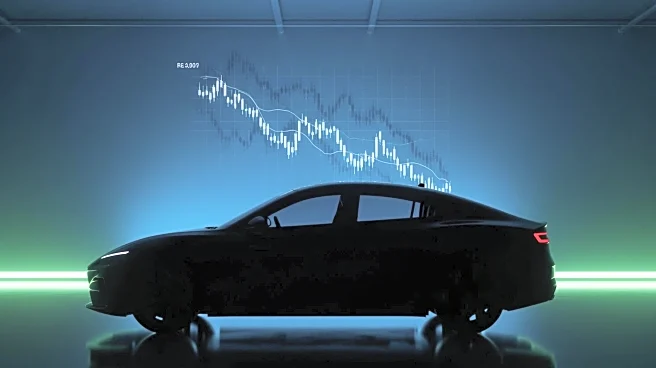What's Happening?
Rivian Automotive's stock has experienced a significant decline, dropping approximately 18% from its late-September highs. Analysts have expressed concerns about slowing electric vehicle (EV) demand and the
expiration of U.S. government incentives, which could impact Rivian's growth. Despite delivering 13,201 vehicles in Q3 2025, Rivian has narrowed its full-year delivery guidance, indicating potential challenges ahead. The expiration of the $7,500 federal EV tax credit for leased vehicles has further complicated the outlook, with analysts predicting a gap in demand for Q4. Rivian's partnerships, including a $5.8 billion joint venture with Volkswagen and a substantial order from Amazon, provide some stability, but the company faces headwinds from new tariffs on imported EV components.
Why It's Important?
The decline in Rivian's stock reflects broader concerns in the EV market, particularly regarding demand and incentives. The expiration of tax credits could lead to reduced consumer interest in EVs, affecting not only Rivian but the entire industry. Rivian's ability to navigate these challenges is crucial for its survival, as it relies on the success of its upcoming R2 model to drive growth. The company's partnerships and investments in new models and factories are vital for maintaining revenue streams and expanding production capacity. However, the need for additional capital and potential shareholder dilution pose risks to Rivian's financial stability.
What's Next?
Rivian's upcoming Q3 earnings call on November 4 will be closely watched for updates on demand trends, tariff relief, and progress on the R2 model. Analysts will be looking for signs of government policy changes that could ease cost pressures and potentially boost the stock. Rivian's long-term success depends on broader EV adoption and the smooth launch of the R2 model. If incentives return, Rivian could regain momentum, but if the EV sales slump continues, the company may need to adjust its ambitious targets.
Beyond the Headlines
The challenges faced by Rivian highlight the importance of government incentives in driving EV adoption. The expiration of tax credits could slow the transition to electric vehicles, impacting environmental goals and the automotive industry's shift towards sustainability. Rivian's situation underscores the need for automakers to innovate and reduce costs to remain competitive in a changing market.










